What’s Wrong With This Picture?
July 14, 1789, that would be 220 years ago, when Frenchmen stormed the Bastille, a Paris prison and released its inmates; all seven of them. They were political prisoners of Louis the 16th. The revolutionaries objected to Louis’ absolute and arbitrary power.
 Martin Chávez announced his third consecutive run for Albuquerque Mayor Sunday afternoon. If he wins, it would be his fourth term.
Martin Chávez announced his third consecutive run for Albuquerque Mayor Sunday afternoon. If he wins, it would be his fourth term.
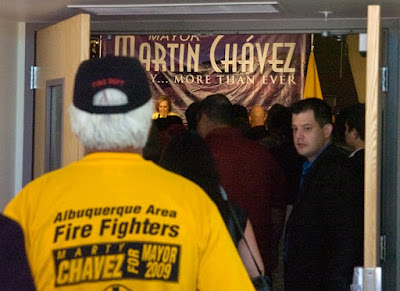 I would like to show you the event, but I can’t. This is the best I can do. It’s a glimpse through the window of Clara Apodaca who introduced Chávez.
I would like to show you the event, but I can’t. This is the best I can do. It’s a glimpse through the window of Clara Apodaca who introduced Chávez.
I was made aware of the event through Chávez’ campaign’s media advisory.
I requested of Griffin by e-mail:
"Please place me on your media notification list for Mayor Martin Chavez' campaign announcements, press releases, event calendar, debates and the like."
Within minutes she responded: "You got it".
 When my blogging colleague Ched MacQuigg, Diogenes' six and I arrived at the Taylor Ranch Community Center to cover the event, I was confronted by Vince Harrison who said, “…that they asked specifically that you not be allowed to be in here.”
When my blogging colleague Ched MacQuigg, Diogenes' six and I arrived at the Taylor Ranch Community Center to cover the event, I was confronted by Vince Harrison who said, “…that they asked specifically that you not be allowed to be in here.”
“Who asked?”
“The campaign,” Harrison said. “And I don’t work for APD anymore, I’m retired.”
“You’re retired?” I asked.
“I retired two months ago,” he said. “That’s the way it’s going to be.”
I advised him that I was notified of the press event and had communicated with Griffin. Harrison got her.
“I didn’t invite you,” Griffin said.
“You wrote me an e-mail,” I responded.
“I said I would keep you posted on things,” she said, “but I never sent you an invite to this,”
“Well it was publicly put (a press advisory) out,” I said.
“It’s an invitation only,” she said.
“Is it a press opportunity or was it not?” I asked.
“It is a private event and the media is welcome,” She said.
OK, media is welcome, you’re now denying I’m media?” I asked.
“It’s a private reception,” Griffin said.
“Are you denying I’m media?” I asked.
“I’m not denying you’re media,” she said, “but you’re not invited.”
“But the media’s not invited?” I asked point to my chest.
“By invitation and you are not invited,”
A television news photographer arrived and overheard the tail end of the conversation and asked, “Did I hear that right?”
“You’re media and I’m not,” I said pointing at myself and then to Griffin.
I withdrew from the doorway.
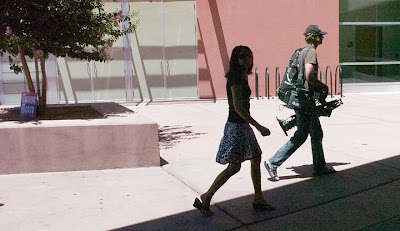
Other members of the media were welcomed.
 APD Westside Commander Conrad Candelaria approached and greeted me. I asked him if he enforced the Constitution?
APD Westside Commander Conrad Candelaria approached and greeted me. I asked him if he enforced the Constitution?
“Of course,“ he said.
“And the First amendment?” I asked.
“Yes, why?” he asked.
I told him I had been uninvited.
“You have to have an invitation?” he asked. “I wasn’t invited.”
I told him he didn’t need an invitation, that it was a public event, but I was specifically being excluded.

 This man came out to taunt MacQuigg and I saying that two sides could play this game. He said that Darren White had not allowed people to attend a Dick Cheney event. I told him he obviously didn’t know that I wrote about that. He called me a liar and said, “We’re following you.”
This man came out to taunt MacQuigg and I saying that two sides could play this game. He said that Darren White had not allowed people to attend a Dick Cheney event. I told him he obviously didn’t know that I wrote about that. He called me a liar and said, “We’re following you.”
The man’s statement can be taken more than one way: I have another reader, or when I cover Chávez, someone covers me.
 Now I believe in security for our top political leaders; there are a bunch of nuts out there willing to physically harm our leaders. Politicians are entitled to be free from such attacks. I’m just not one of those nuts.
Now I believe in security for our top political leaders; there are a bunch of nuts out there willing to physically harm our leaders. Politicians are entitled to be free from such attacks. I’m just not one of those nuts.
I take pictures.
I have never so much as asked Chávez a question at a press conference. So it is an incredible waste of money to pay a police sergeant and other officers to dog me, which might distract them from a real threat.
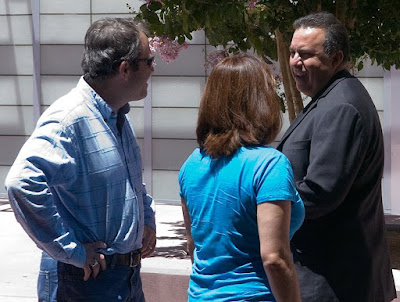 Albuquerque Police Department's Mayoral Protection Detail Sergeant Louie Sanchez, right, with former State Democratic Party Chairman John Wertheim and his wife Bianca Ortiz-Wertheim,who was Chávez' former chief of staff before becoming State Director at U.S. Senator Tom Udall's Albuquerque office.
Albuquerque Police Department's Mayoral Protection Detail Sergeant Louie Sanchez, right, with former State Democratic Party Chairman John Wertheim and his wife Bianca Ortiz-Wertheim,who was Chávez' former chief of staff before becoming State Director at U.S. Senator Tom Udall's Albuquerque office.
Sanchez did not get directly involved, but did monitor us. During the initial conversation, he was within ear shot.
He met a SUV and escorted a young woman into the building.
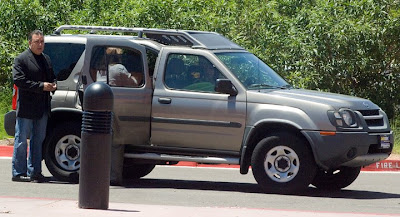 One has to wonder if Sanchez' presence was to protect the mayor why would he be engaged in some unrelated task?
One has to wonder if Sanchez' presence was to protect the mayor why would he be engaged in some unrelated task?
 Sanchez was on the telephone constantly while monitoring us.
Sanchez was on the telephone constantly while monitoring us.
 We stood in the shade greeting politicos and MacQuigg holding the door for this burdened member of the press as she arrived.
We stood in the shade greeting politicos and MacQuigg holding the door for this burdened member of the press as she arrived.
 I usually don’t comment on security tactics, but this one needs mentioning for the benefit of proper procedures. I show five examples of vehicle placement for political movement:
I usually don’t comment on security tactics, but this one needs mentioning for the benefit of proper procedures. I show five examples of vehicle placement for political movement:
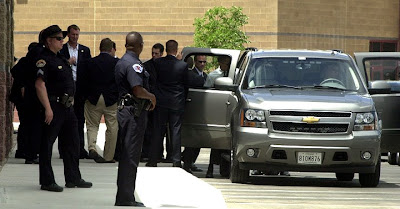 This is Sen. Barack Obama during an early visit to Albuquerque. The Secret Service’s SUV pulled straight ahead as it left in a motorcade.
This is Sen. Barack Obama during an early visit to Albuquerque. The Secret Service’s SUV pulled straight ahead as it left in a motorcade.
 While this is Gov. Bill Richardson, with his communications staff aide, Caitlin Kelleher, after a bill signing at Albuquerque Fire Station 1. Richardson’s State Police SUV was backed into the parking lot and his driver was ready to go as another officer, seen in the reflection, far left holds the door. The vehicle pulled forward as it left.
While this is Gov. Bill Richardson, with his communications staff aide, Caitlin Kelleher, after a bill signing at Albuquerque Fire Station 1. Richardson’s State Police SUV was backed into the parking lot and his driver was ready to go as another officer, seen in the reflection, far left holds the door. The vehicle pulled forward as it left.
 During Chávez' announcement, the APD SUV Chávez uses, was placed facing into the parking lot, rather than outward, which in an emergency could prove problematic.
During Chávez' announcement, the APD SUV Chávez uses, was placed facing into the parking lot, rather than outward, which in an emergency could prove problematic.
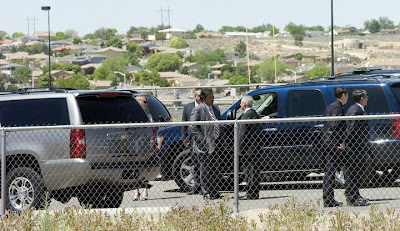
At the Presidential visit to Rio Ranch High School, May 14, APD followed the lead of the Governor's detail and lined up in the same direction. Chávez and Richardson talk near their vehicles.
 APD's Mayoral Protection Detail could easily go to school off of the U.S. Secret Service by simply watching how agents handle the Presidential limousine, nicknamed "The Beast."
APD's Mayoral Protection Detail could easily go to school off of the U.S. Secret Service by simply watching how agents handle the Presidential limousine, nicknamed "The Beast."
 Though it is reported that APD Mayor’s Security Detail received special training, they appear to be more chauffer and gophers than professional security.
Though it is reported that APD Mayor’s Security Detail received special training, they appear to be more chauffer and gophers than professional security.
 Chávez’s Chief Public Safety Officer Pete Dinelli, left, defended the need for the security detail after candidate Romero challenged them. This would be the same Pete Dinelli who as a rookie City Councillor 25 years ago, threw a wild and loud fit through the media, when newly elected Mayor Ken Schultz was assigned an officer as a bodyguard. The officer had been a volunteer who drove and escorted Schultz during the campaign. It didn’t matter to Dinelli at the time that there were credible threats determined through risk assessments. It might not have been the same level of credible threat that Chávez faces today, but Dinelli has certainly changed his tune. I was union president at the time and was involved in authorizing the hand picked officer under what is known as the “for the good of the department” clause, bypassing a competitive bid process. Schultz was comfortable with the officer and is who he wanted, so that is who he got.
Chávez’s Chief Public Safety Officer Pete Dinelli, left, defended the need for the security detail after candidate Romero challenged them. This would be the same Pete Dinelli who as a rookie City Councillor 25 years ago, threw a wild and loud fit through the media, when newly elected Mayor Ken Schultz was assigned an officer as a bodyguard. The officer had been a volunteer who drove and escorted Schultz during the campaign. It didn’t matter to Dinelli at the time that there were credible threats determined through risk assessments. It might not have been the same level of credible threat that Chávez faces today, but Dinelli has certainly changed his tune. I was union president at the time and was involved in authorizing the hand picked officer under what is known as the “for the good of the department” clause, bypassing a competitive bid process. Schultz was comfortable with the officer and is who he wanted, so that is who he got.
Dinelli, in his role as City Councillor, demanded that then Chief of Police Sammy Baca fire several officers based solely on news accounts, according to Baca. Baca had refused, citing due process; to which Dinelli scoffed.
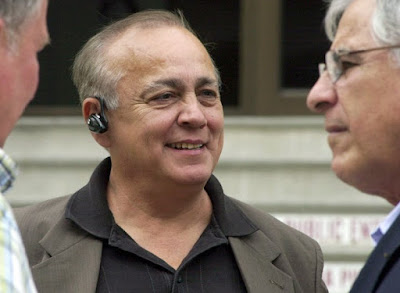 Several weeks ago Baca, center, stood behind Richard Romero, right, at a press conference on crime. I hadn’t seen or talked to Baca in more than 20 years. I was the newly elected Union president and days later he was appointed the new chief.
Several weeks ago Baca, center, stood behind Richard Romero, right, at a press conference on crime. I hadn’t seen or talked to Baca in more than 20 years. I was the newly elected Union president and days later he was appointed the new chief.
 KRQE’s Alex Tomlin read a question that she said she got directly from Chávez, challenging Romero’s legislative record on crime bills. Chávez indicated Romero had never introduced crime legislation.
KRQE’s Alex Tomlin read a question that she said she got directly from Chávez, challenging Romero’s legislative record on crime bills. Chávez indicated Romero had never introduced crime legislation.
The mayor’s announcement is hardly crucial news; Chávez has been running a campaign since his rivals entered and began making charges against him. His announcement was a foregone conclusion. However, it is the duty of the press to cover it.
 So what’s wrong with this picture?
So what’s wrong with this picture?
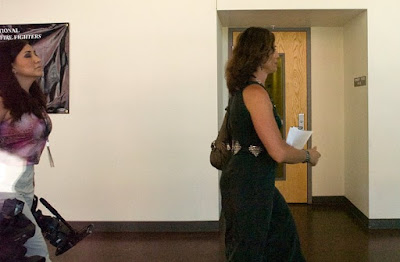 Griffin escorted the late arriving KRQE video journalist after the event started.
Griffin escorted the late arriving KRQE video journalist after the event started.
This is not my first contact with Griffin.
In April, I was asked by the New Mexico Chapter of the Public Relations Society of America to document their 2009 Cumbre Awards.
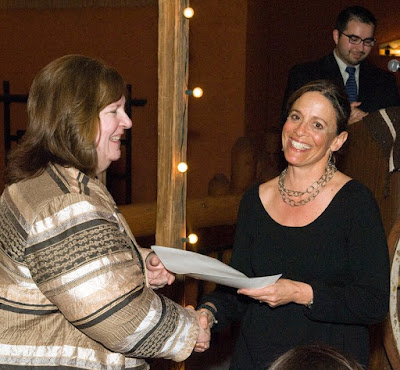 Griffin & Associates, won a couple of awards for their marketing campaign for Taos.
Griffin & Associates, won a couple of awards for their marketing campaign for Taos.
Psychologists have determined that people have moments where they have uncontrollable facial movement that reveals their true emotions. These are referred to as micro expressions. Psychologists believe they can be read as indicators of lying.
Through my Police training, I was taught in classes, about non-verbal communications, as interrogation techniques about how to look for such, nearly imperceptible gestures. Most often one has to use motion picture film or videotape and watch it frame by frame to discern them. Without film, or by paying close attention, one might catch them every once in a while.
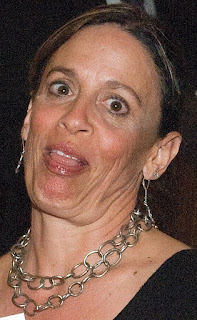 I have photographically recorded such expressions a few times over the years. However, sometimes they last more than a mere fleeting moment. Sometimes a person will flash a sign of disgust, by making a face. I’ve seen Griffin do it more than once. This is not a micro expression; it’s more a macro expression.
I have photographically recorded such expressions a few times over the years. However, sometimes they last more than a mere fleeting moment. Sometimes a person will flash a sign of disgust, by making a face. I’ve seen Griffin do it more than once. This is not a micro expression; it’s more a macro expression.
Much like polygraphs, I believe that reading micro expression is actually only an observation indicating stress or discomfort that might also be associated with deception, but is not proof of a lie. Too many people, psychologists and law enforcement alike want to make the leap from a signal to mean it is a fact.
The role of one who photographically documents political activity is to attempt to capture these expressions, especially if they are in conflict with the spoken message. This pursuit applies to all politicians; Chávez, however has a particularly telling face. Apparently he knows it and doesn't want anyone to see it.
The point of this is that Griffin can’t keep her own stories straight. She puts out a press advisory then wants to select and define who the press are based on the personal dislikes of her boss, the mayor.
The question is why, as a public relations professional, would she not invite absolutely everyone and then make sure her candidate has a wonderful performance that can’t be questioned or faulted.
Had I been allowed in, I would have returned with a handful of political portraits with a reasonably short shelf life due to the background setting.
 Analysis
Analysis
Unlike the last mayoral race, four years ago, when Chávez had a campaign war chest of well over a million dollars, this year he has opted to use public financing – some $330,000 of taxpayer money. It changes some of the assumptions that have been made in the past about Party and who gets involved.
Griffin was Chávez’ communications director four years ago and has accepted the role again. She ran for the District six City Council seat with the support of Chávez. Current Councilor Rey Garduño won, while she finished third in a four-way race.
She faced ethical questions during her run.
Griffin is the president elect of the New Mexico Chapter of the Public Relations Society of America and will take office next year.
 Public Relations Society of America Member
Public Relations Society of America Member has a
Code of Ethics to which Griffin is bound:
PRSA Code Provisions
FREE FLOW OF INFORMATION
Core Principle: Protecting and advancing the free flow of accurate and truthful information is essential to serving the public interest and contributing to informed decision making in a democratic society.
Intent: To maintain the integrity of relationships with the media, government officials, and the public.
CONFLICTS OF INTEREST
Core Principle: Avoiding real, potential or perceived conflicts of interest builds the trust of clients, employers, and the publics.
Intent: To earn trust and mutual respect with clients or employers.
To build trust with the public by avoiding or ending situations that put one's personal or professional interests in conflict with society's interests.
ENHANCING THE PROFESSION
Core Principle: Public relations professionals work constantly to strengthen the public's trust in the profession.
Intent: To build respect and credibility with the public for the profession of public relations.
Report ethical violations, whether committed by PRSA members or not, to the appropriate authority.
Griffin has a history of providing marketing services for various City Departments over the years.
Recently Griffin was awarded a sole source, no bid contract for some $49,000 for marketing at SunTran, the bus system. Had the contract been for more than $50,000, the City Council would have had to approve it.
She is involved in many of Chávez’ ventures including this past weekend’s Mayoral Ball at the Zoo.
Griffin’s loyal support and assistance does not go unrewarded. Not only is she compensated as communications director in Chávez’ campaigns, but she has received multiple marketing contracts and personal support and encouragement from Chávez and his vast entourage to assist her own political ends.
Because marketing is a creative venture, it is hard determine the actual cost of its product and what the profit margin is. Therefore, the value of a $49,000 plus contract might actually only cost Griffin $20,000 to accomplish and provide her with a huge profit margin that she may use to pad her cost of time working on the campaign. She didn’t become a successful businesswoman by giving her products away. Yet marketing is about changing perceptions and that often does not require being honest or telling the truth.
It is proper for Chávez to hire a campaign communications director/spokesperson now that he is "officially" in the race.
 It was improper for City paid employees from the mayor's office to respond to campaign related issues. Chávez’ Chief Public Information Officer Deborah James should not be commenting for the campaign as she was forced to do absent the announcement.
It was improper for City paid employees from the mayor's office to respond to campaign related issues. Chávez’ Chief Public Information Officer Deborah James should not be commenting for the campaign as she was forced to do absent the announcement.
James, right, here on May 1, 2007 at a budget briefing at the Bear Canyon Senior Center with then APD Detective Vince Harrison.
Fifteen years ago Chávez removed me from my APD's video productions unit assignment. The job had been made permanent as a result of a settlement of a grievance with the department for its failure to adhere to its transfer policy. Chávez ignored the binding settlement and I was assigned a civilian entry level job in records. I worked under demeaning conditions for more than three years.
My final video production was to work with James on a project for Chávez; it was a disaster.
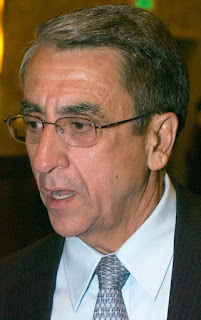 Chief Public Safety Officer Dinelli, right, came to the political defense of Chief of Police Ray Schultz when Romero said, if elected he would replace the chief. Schultz "is the finest chief we've had" reporter T.J. Wilham twittered July 9. Dinelli, who serves at the pleasure of the mayor, and had considered a run for the office when Chávez was contemplating running for the U.S. Senate, is of course entitled to his own opinion. However, Dinelli probably shouldn't be making political comments during working hours that look like official statements.
Chief Public Safety Officer Dinelli, right, came to the political defense of Chief of Police Ray Schultz when Romero said, if elected he would replace the chief. Schultz "is the finest chief we've had" reporter T.J. Wilham twittered July 9. Dinelli, who serves at the pleasure of the mayor, and had considered a run for the office when Chávez was contemplating running for the U.S. Senate, is of course entitled to his own opinion. However, Dinelli probably shouldn't be making political comments during working hours that look like official statements.
Of course Dinelli's legacy is directly dependent upon Chief Schultz' performance.

My Take
In the democratic election process. the people have a right to see and hear those who want to lead them so they may be fairly evaluated their worth as leaders.
I’m not a Leni Riefenstah; I don’t do propaganda, nor am I supporting any candidate in the mayoral race.
Yet Chávez insists the media portray him in what he sees as his best light. His announcement was advertised to the press as a photo opportunity and he took no questions from the podium. His press relations mirror the communist model of journalism, government controlled.
Fellow blogger Kate Nash of Green Chili Chatter and Staff Writer for the Santa Fe New Mexican traveled with Gov. Bill Richardson to visit Venezuelan President Hugo Chávez a few years back. She tells a story of waiting in the hall outside the room where the politicians met and spoke with the Venezuelan press. They asked her about her association with Richardson and she had difficulty explaining that she represented a free and independent press. They were employees of the state run media and couldn’t understand.
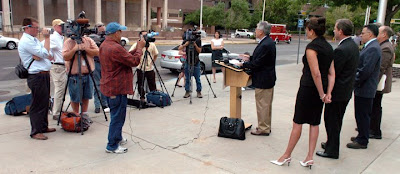 Martin Chávez is not above, during the working day, sending his salaried staffer Jacob Winowich, far left, to video Romero's press conference.
Martin Chávez is not above, during the working day, sending his salaried staffer Jacob Winowich, far left, to video Romero's press conference.
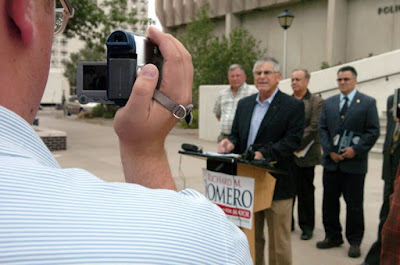 It seems Chávez believes that it is OK for him to send his watcher to record his opponents (which it is), but it's not alright to allow an independent journalist to cover him.
It seems Chávez believes that it is OK for him to send his watcher to record his opponents (which it is), but it's not alright to allow an independent journalist to cover him.
Chávez usually gets what he wants from the media because most TV journalists simply turn on their cameras and let him perform for a few seconds. Chávez has honed his delivery. Several years ago, he would hold at least one press conference/photo opportunity a day with his theme of the day. The local media and the citizenry tired of his constant presence and he began to be ignored. He’s a smart guy; he changed tactics. He selected his issues more carefully.
Chávez is controlling his media exposure. I predict there will be very little public debate. He will agree to a limited number of debates and joint public forums unless some issue threatens he comfortable lead.
 Chávez has been criticized for using his office to promoted himself as he drug himself into the campaign.
Chávez has been criticized for using his office to promoted himself as he drug himself into the campaign.
I see it a bit differently. We elect leaders for specific time frames. They run on platforms that resonate with enough voters to get them elected. They have the prerogative to put forth their agenda. Those who didn’t vote for the victor, and opponents oftentimes snipe at their former rivals condemning their every action.
The mayor is mayor until November 30, 2009 and by Charter he is to devote his full time and attention to the city. Last year I pointed out that Chávez would have to violate the Charter to run for U.S. Senate. He withdrew so the issue became moot. His run for reelection does not pose the same question because he does not have to leave the city to run. Campaigning does not conflict with the charter provision that:
Charter of the
City of Albuquerque
Article V. Mayor
Section 3. Powers; Performance; Appointments.
The Mayor shall devote full time and attention to the performance of the duties of office and shall hold no other paid public or private employment.
Critics, opponents and some City councilors complained that Chávez used his position to place his image before the public through the use of city paid public service announcements ranging from bicycle paths to protecting children from cyber stalkers, to promoting the city’s annually sponsored Fourth of July celebrations. I disagree. Though he does benefit by name recognition and the timing might have been helpful as he approaches the campaign season, Chávez is still the mayor and may still prosecute his agenda. It is the power of incumbency. The voters get to determine if he crosses the line and his rivals have an equal right to suggest that he’s crossed the line.
Some of the local media act as Chávez lapdogs. KKOB had given the “Mayor” a free and open microphone on a Saturday afternoon talk show prior to his Senate campaign starting. KKOB withdrew that offer so they were not perceived as being unfair to announced candidates. The Journal editorial staff has regularly scheduled meetings with the mayor. Other outlets don’t have such access. He has access to speak directly to the public on his own show, the Q Hour "New Mexico's New Talk Radio" - AM 1550 KIVA which is also cablecast through the government access cable channel 16.
 The stage at the community center was set, bathed in klieg lights. From television coverage and what other bloggers got, the presentation was well choreographed. Slick signs, bumper stickers and banners were evidence of a well-seasoned campaigner with years of experience. The crowd was made up of City Hall insiders, staff, employees, political operatives, other elected officials, volunteers and supporters. The Firefighter union members wore yellow T-shirt touting their support.
The stage at the community center was set, bathed in klieg lights. From television coverage and what other bloggers got, the presentation was well choreographed. Slick signs, bumper stickers and banners were evidence of a well-seasoned campaigner with years of experience. The crowd was made up of City Hall insiders, staff, employees, political operatives, other elected officials, volunteers and supporters. The Firefighter union members wore yellow T-shirt touting their support.
Though the announcement did not have the grandeur of the Nuremberg Rallies as documented in Riefenstahl’s Triumph of the Will, this event had some of the basic concepts in building a cult of personality. Ultimately, some of the aspects on display was thuggery, propaganda, eviction and punishment of perceived enemies.
 I was prepared to go to jail.
I was prepared to go to jail.
I have noted a series of events where Chávez’ security officers have intensified their efforts towards barring me from the mayors events over the past couple of years.
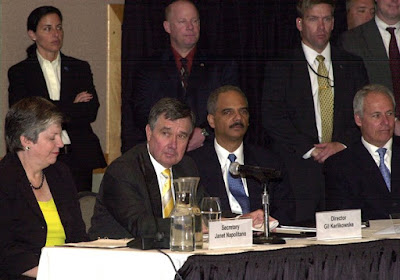 The last event I attended where the mayor, right, was present was the June 5, 2009, Homeland Security Advisory Council Meeting at the University of New Mexico hosted by Secretary of Homeland Security Janet Napolitano, left, with Attorney General Eric Holder, second to the right, and Director of the Office of National Drug Control Policy Gil Kerlikowske, second to the left.
The last event I attended where the mayor, right, was present was the June 5, 2009, Homeland Security Advisory Council Meeting at the University of New Mexico hosted by Secretary of Homeland Security Janet Napolitano, left, with Attorney General Eric Holder, second to the right, and Director of the Office of National Drug Control Policy Gil Kerlikowske, second to the left.
Napolitano said she was glad to be home and announced that she had graduated from Sandia High School, which drew a single boo. She suggested there must have been a crosstown rival from Highland High in the room.
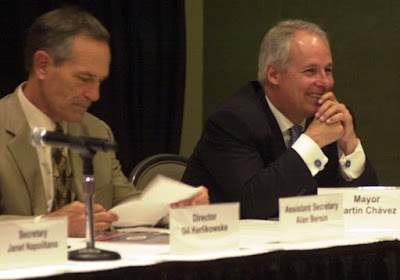 Chávez, sitting with DHS Assistant Security for International Affairs Alan Bersin, got a good laugh when he admitted that he booed because he had attended Manzano High. He conceded that booing might limit his prospects of getting a job in Washington as a result.
Chávez, sitting with DHS Assistant Security for International Affairs Alan Bersin, got a good laugh when he admitted that he booed because he had attended Manzano High. He conceded that booing might limit his prospects of getting a job in Washington as a result.
Chávez’ security officers stayed clear of me and we had no interaction.
However, the announcement event was different. Though the police were very much in evidence and close, they had agents do their dirty work for them. The newly retired APD officer intercepted me before I could get completely into the building and addressed me in an authoritative way and was not forthcoming that he was no longer an officer. Initially Harrison didn't mention that he was retired and might have been trying to get me to believe he was still a cop. Not quite enough to allege a charge of impersonating a police officer, but he was pushing it for a moment.
There was no way I could disobey an officer's unlawful order, or to engage in an act of civil disobedience by refusing to step down, and insisting on, "nothing less than booking." If I had found that way I would not have signed a citation or agreed to leave. I would not have cooperated with the booking process or identified myself for court officers. I would have become Chávez’ political prisoner. Nothing requires physical resistance, just a mental challenge toward my former brothers and to test their oaths of office and ethics.
The fact that the officers did not step up changes little about the underlying premise; it only exposes the agents to risks that the officers might have protection by being sworn.
Ultimately, these agents and officers answer to the mayor and stand opposed to the fundamental principles upon which this country is based. The mayor is a full time tax paid employee of the people of the City of Albuquerque. The event took place in a City owned facility rented and paid for with tax money in the form of public financed election.
The public financing of elections is supposed to open the process and not used to close it.
Griffin spoke for the campaign and violated her PRSA Member Code of Ethics Pledge, which reads:
I pledge:
To conduct myself professionally, with truth, accuracy, fairness, and responsibility to the public; To improve my individual competence and advance the knowledge and proficiency of the profession through continuing research and education; And to adhere to the articles of the Member Code of Ethics 2000 for the practice of public relations as adopted by the governing Assembly of the Public Relations Society of America.
I understand and accept that there is a consequence for misconduct, up to and including membership revocation.
And, I understand that those who have been or are sanctioned by a government agency or convicted in a court of law of an action that is in violation of this Code may be barred from membership or expelled from the Society.
Happy Bastille Day.
Note: Due to technical issues, this post didn't appear until Thursday.
 A month ago I found this one car hit and run wreck abandoned in my neighborhood early in the morning. I called 911 and eventually a total of seven public safety vehicles descended on the scene. They included the Albuquerque Police Department with four units, an Albuquerque Fire Department pumper to clean up the hazardous materials leaking from the car, and a University of New Mexico Police Department officer who was patrolling adjacent school property. A security guard also was on scene early. For all the standing around and looking that officers did, ultimately nothing happened. The vehicle was reported stolen shortly after the crash.
A month ago I found this one car hit and run wreck abandoned in my neighborhood early in the morning. I called 911 and eventually a total of seven public safety vehicles descended on the scene. They included the Albuquerque Police Department with four units, an Albuquerque Fire Department pumper to clean up the hazardous materials leaking from the car, and a University of New Mexico Police Department officer who was patrolling adjacent school property. A security guard also was on scene early. For all the standing around and looking that officers did, ultimately nothing happened. The vehicle was reported stolen shortly after the crash. Chávez gave an up to 14 percent raise during his first term and the huge increase in the last contract. In 1999, Chávez shook hands with then APOA President Alex Marentes with Vice President Paul Pecheco after signing the contract.
Chávez gave an up to 14 percent raise during his first term and the huge increase in the last contract. In 1999, Chávez shook hands with then APOA President Alex Marentes with Vice President Paul Pecheco after signing the contract. Don’t confuse financial support for officers with being tough on crime. Chávez is not above manipulating the labor relations process. He appointed the APOA's chief negotiator Lawrence Torres, right with Marentes in 1999, to be director of employee relations.
Don’t confuse financial support for officers with being tough on crime. Chávez is not above manipulating the labor relations process. He appointed the APOA's chief negotiator Lawrence Torres, right with Marentes in 1999, to be director of employee relations. The majority of officers work hard, with honor and distinction. They deserve the greatest support possible. I am glad to see others, like Lieutenant Jan Olstad, above, standing on the freeway at a wreck summonsing assistance. I don’t miss the younger persons' game.
The majority of officers work hard, with honor and distinction. They deserve the greatest support possible. I am glad to see others, like Lieutenant Jan Olstad, above, standing on the freeway at a wreck summonsing assistance. I don’t miss the younger persons' game. With crime being a major topic in the newly beginning mayoral campaign, all three major candidates are playing the police card.
With crime being a major topic in the newly beginning mayoral campaign, all three major candidates are playing the police card. The publicly financed candidates are: incumbent Mayor Martin Chávez, opponents, former Democratic State Senator Richard Romero, and current Republican State Representative R.J. Berry.
The publicly financed candidates are: incumbent Mayor Martin Chávez, opponents, former Democratic State Senator Richard Romero, and current Republican State Representative R.J. Berry.  Oops! Maybe not, there was a television production crew filming the TV series “Crash” at Fourth Street and Gold Avenue Friday.
Oops! Maybe not, there was a television production crew filming the TV series “Crash” at Fourth Street and Gold Avenue Friday. Crash stars long time New Mexican, Dennis Hopper, seen here speaking to the Albuquerque Press Club, circa 1970, about filming in New Mexico. He had co-written with Peter Fonda and directed, Easy Rider in 1969.
Crash stars long time New Mexican, Dennis Hopper, seen here speaking to the Albuquerque Press Club, circa 1970, about filming in New Mexico. He had co-written with Peter Fonda and directed, Easy Rider in 1969. Fourteen years ago, during his first term, Chávez told officers his plan for increasing the department’s strength. He proposed that by 1998 there would be 1,078 officers.
Fourteen years ago, during his first term, Chávez told officers his plan for increasing the department’s strength. He proposed that by 1998 there would be 1,078 officers. Here, a recent APD Academy class goes on its final traditional run to downtown and past headquarters. There is a legitimate question as to how many officers are currently on the job.
Here, a recent APD Academy class goes on its final traditional run to downtown and past headquarters. There is a legitimate question as to how many officers are currently on the job. This group, with almost 140 years of combined experience in law enforcement, stood behind Romero at his crime press conference; they are all retired Albuquerque Police officers: Captain David “Marty” Gilmore, Chief Sam Baca, Lieutenant Edmund Perera, who recently graduated from UNM Laws School and passed the Bar Exam, Sergeant Earl Holmes, who is now the Attorney General’s Investigations Division Director and Detective Michelle Garcia, who is the Attorney General’s Chief of Staff.
This group, with almost 140 years of combined experience in law enforcement, stood behind Romero at his crime press conference; they are all retired Albuquerque Police officers: Captain David “Marty” Gilmore, Chief Sam Baca, Lieutenant Edmund Perera, who recently graduated from UNM Laws School and passed the Bar Exam, Sergeant Earl Holmes, who is now the Attorney General’s Investigations Division Director and Detective Michelle Garcia, who is the Attorney General’s Chief of Staff.  Sir Robert Peel founded modern policing, 180 years ago, when he developed the London Metropolitan Police Department at Scotland Yard in 1829. He developed Peel's Principles, which are still completely valid.
Sir Robert Peel founded modern policing, 180 years ago, when he developed the London Metropolitan Police Department at Scotland Yard in 1829. He developed Peel's Principles, which are still completely valid. The news coverage of such crimes as the serial killings on the west mesa and the small child buried in a city park earlier this year became more about the emotional demonstrations of grieving families and distraught neighbors. No doubt families and friends grieve in different manners and public outrage may abound.
The news coverage of such crimes as the serial killings on the west mesa and the small child buried in a city park earlier this year became more about the emotional demonstrations of grieving families and distraught neighbors. No doubt families and friends grieve in different manners and public outrage may abound. News coverage of these events sometimes takes on a surreal or circus quality. I've attended such events, but never posted before. There is something morbid about doing stories of the public grief. Some believe there is a cathartic release in such public demonstrations and there is nothing more compelling for television news than raw emotion.
News coverage of these events sometimes takes on a surreal or circus quality. I've attended such events, but never posted before. There is something morbid about doing stories of the public grief. Some believe there is a cathartic release in such public demonstrations and there is nothing more compelling for television news than raw emotion. Shoving a microphone in the face of a grieving family member is the act of a mental dwarf, to paraphrase Linda Ellerbee, former NBC Overnight host and author of, “’And So It Goes’ Adventures in Television."
Shoving a microphone in the face of a grieving family member is the act of a mental dwarf, to paraphrase Linda Ellerbee, former NBC Overnight host and author of, “’And So It Goes’ Adventures in Television." Then Chief Joe Polisar, left, leaves a press conference, on the front steps of police headquarters, where he announced the status of the ongoing mass murder investigation. Investigators brought the case to a successful conclusion by making multiple arrests days later. District Attorney Bob Schwartz, in blue denim jacket, and the FBI agent assigned to the case spoke to a large press gathering. This was before bloggers were reporting news. Today a hundred investigators are assigned to the west mesa homicides and yet the politicians are indirectly beating on officers for their lack of progress.
Then Chief Joe Polisar, left, leaves a press conference, on the front steps of police headquarters, where he announced the status of the ongoing mass murder investigation. Investigators brought the case to a successful conclusion by making multiple arrests days later. District Attorney Bob Schwartz, in blue denim jacket, and the FBI agent assigned to the case spoke to a large press gathering. This was before bloggers were reporting news. Today a hundred investigators are assigned to the west mesa homicides and yet the politicians are indirectly beating on officers for their lack of progress.

























